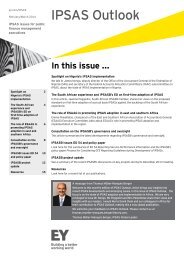You also want an ePaper? Increase the reach of your titles
YUMPU automatically turns print PDFs into web optimized ePapers that Google loves.
Let’s celebrate …and then move onThere is therefore good reason to pause and celebrate the progress of a region that was dismissed at the beginningof the 2000s as “the hopeless continent.” That said, it is important, too, that we do not get caught up in a latter-day‘gold rush’ mentality. Most African countries still have a long way to go to emulate Asia’s sustained growth path. Inmany respects, Africa is perhaps today at a point where many of the east Asian economies were in the 1970s, and thelikes of India, Mexico and Turkey were in the 1980s.By 2030, in terms of per capita income, SSA will reach the level whereEmerging Asia is today6000500051454706400039033000200010000303518782003 05 07 09 11 13 15 17 19 21 23 25 27 29BRICsSouth-East AsiaEmerging AsiaEastern EuropeSub-SaharanAfricaSource: United Nations Development Programme, HDI ranking growth rate for changes in HDI rankingThere is no doubt that, with an increasingly solid foundation ofeconomic, political and social reform, together with resilient growthrates, Africa has the potential to emulate Asia’s remarkable growthstory. If we look forward, at currently forecasted economic growthrates, the Nigerian economy may well be 1 of the world’s 20 largestwithin the next decade. Despite lower growth rates, the SouthAfrican economy will still likely double in size by 2024. In today’sterms, this would position both SA and Nigeria among the top 20largest economies in the world, of a similar size to the economiesof Turkey and the Netherlands, and larger than the majority ofEuropean economies. The forecasted size of Egypt’s economyby 2024 would also make it one the 25 largest economies in theworld today (on a par with Sweden and Norway), and the Angolaneconomy is set to almost triple in size to about the equivalent ofColombia or the UAE today (and larger than Denmark, Malaysiaor Chile). A number of other economies across the continent –including Kenya, Ghana, Tanzania, Zambia, Mozambique, Ethiopia,and so on – are also forecast to experience strong economic growth.However, no right-minded person is suggesting that Africa hasbeen transformed into an economic powerhouse in the space ofa few short years. As we look forward towards 2030, nothing isguaranteed. There are still many challenges ahead, not least ofwhich is a robust structural transformation – required across manyeconomies - that will not only lessen dependency on commodities,but also expand the private sector, increase productivity levels and,most of all, create jobs.Africa 2030: Realizing the possibilities21





